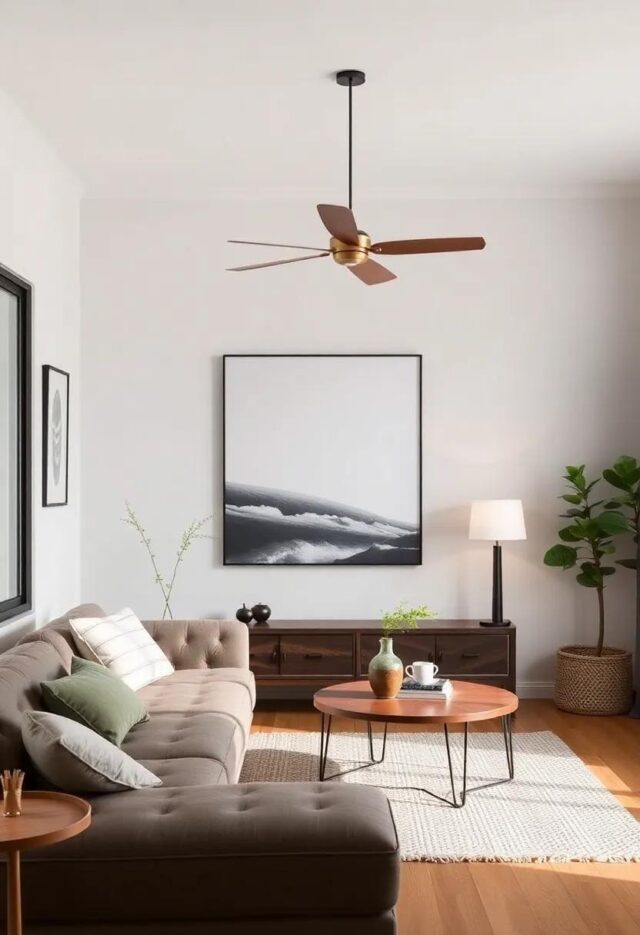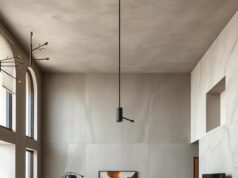in a world that frequently enough feels overwhelmingly busy, the quest for tranquility has never been more pertinent. Enter the minimalist small living room—a sanctuary that marries simplicity adn serenity, allowing us to reclaim our space and, ultimately, our peace of mind. Embracing tranquility thru minimalist aesthetics invites us to strip away the superfluous, focusing instead on what truly matters. This article will explore the art of crafting a small living room that embodies calmness and clarity, revealing how intentional design choices can transform even the most compact spaces into havens of harmony. From thoughtful color palettes to purposeful furnishings, each aspect plays a vital role in creating an oasis that nurtures relaxation and enhances our daily lives. Join us on this journey as we unveil the beauty and functionality that lies within the art of minimalist small living room aesthetics.
Embracing Serenity Through Light: The Role of Natural Illumination in Small Spaces
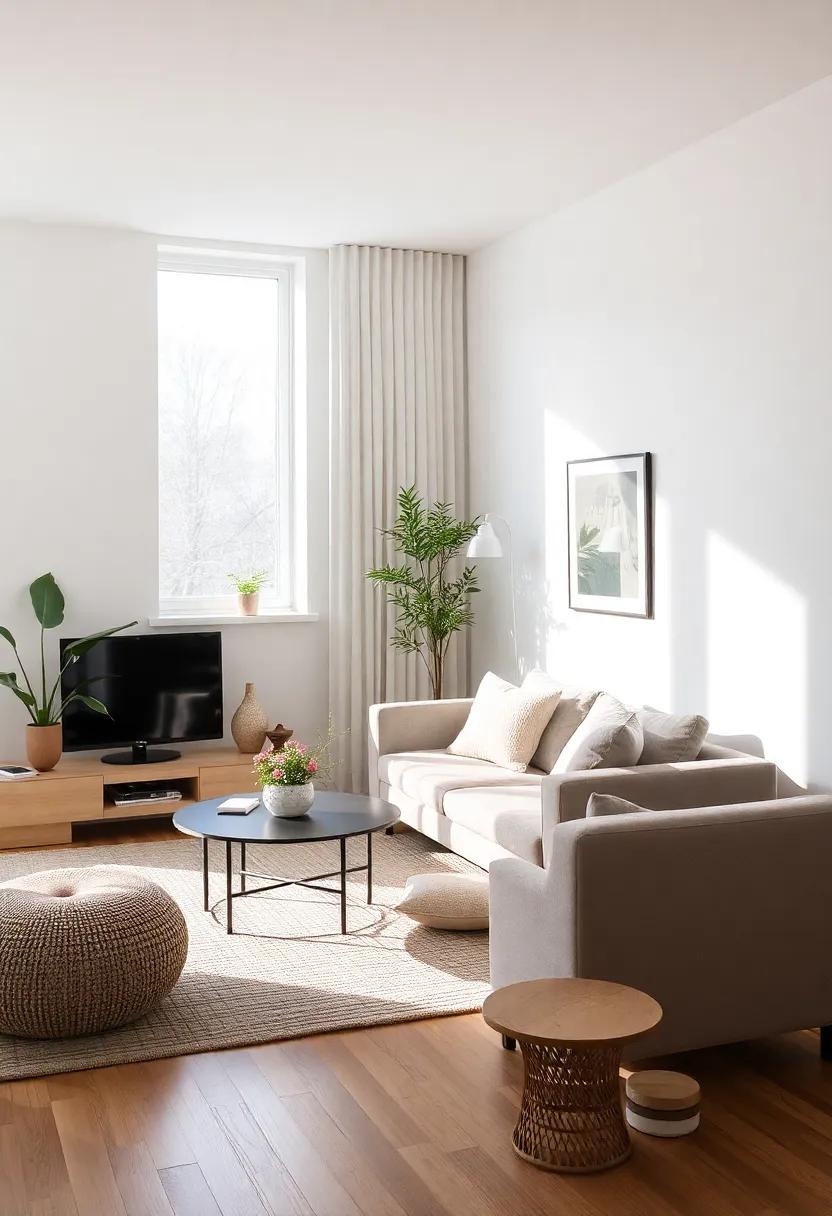
Natural light plays a crucial role in fostering a sense of peace within the confines of a small living space. By allowing sunlight to permeate through windows and reflect on light-colored surfaces, you can create an inviting and uplifting ambiance. Consider these strategies to harness natural illumination:
- Opt for sheer curtains that filter light while maintaining privacy.
- Position mirrors strategically to bounce light around the room, making it feel larger.
- Select a light palette for walls and furnishings to enhance brightness.
- Incorporate plants to soften the space and add a touch of vibrancy.
The balance of light not only elevates mood but also emphasizes the minimalist aesthetic that creates tranquility. illuminated surfaces and thoughtfully curated decor can accentuate the simplicity of design, thus enhancing the overall spatial experience. When curating a small living room, aim for:
| Element | Effect |
|---|---|
| Natural Light | Enhances perceived space |
| Warm Tones | Creates comfort |
| Minimal Accessories | Promotes clarity |
Ultimately, the thoughtful arrangement of light and elements can transform a small living room into a serene sanctuary that resonates with the spirit of minimalist living.
Neutral Palette Wonders: The Power of Color in Minimalist Living Room Designs
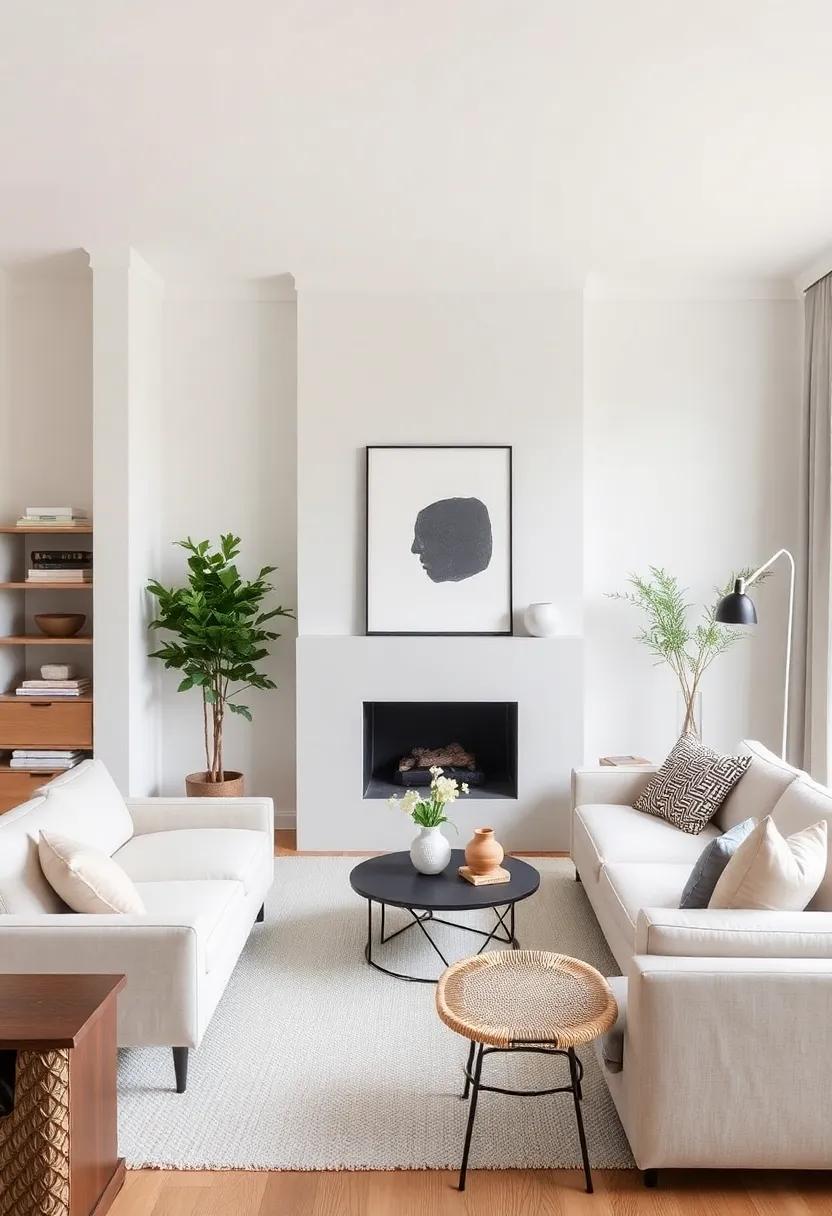
Neutral tones, with their soft and calming essence, play a crucial role in the minimalist living room aesthetic. When thoughtfully applied, these palettes can create an inviting oasis that allows the mind to unwind. Incorporating hues such as warm beiges, soft grays, and subtle whites can establish a serene backdrop that highlights the beauty of simplicity. the key lies in the careful selection of textures and materials. For instance, mixing natural elements like wood, linen, and stone can evoke a sense of balance and harmony, elevating the overall design while maintaining a clutter-free environment.
Moreover, the allure of a neutral palette extends beyond the aesthetics; it influences mood and perception. By introducing elements that invite visual interest—like geometric patterns or curated art pieces—one can maintain a sense of minimalism without it feeling stark or sterile. To exemplify the power of color in minimalist designs, consider the following combinations:
| Color Combination | Effect |
|---|---|
| Beige & Olive Green | Warmth and organic feel |
| Soft Gray & Soft Pink | Calm and soothing ambiance |
| White & Cream | Timeless elegance |
Simplistic Elegance: The Beauty of Functional Furniture Choices
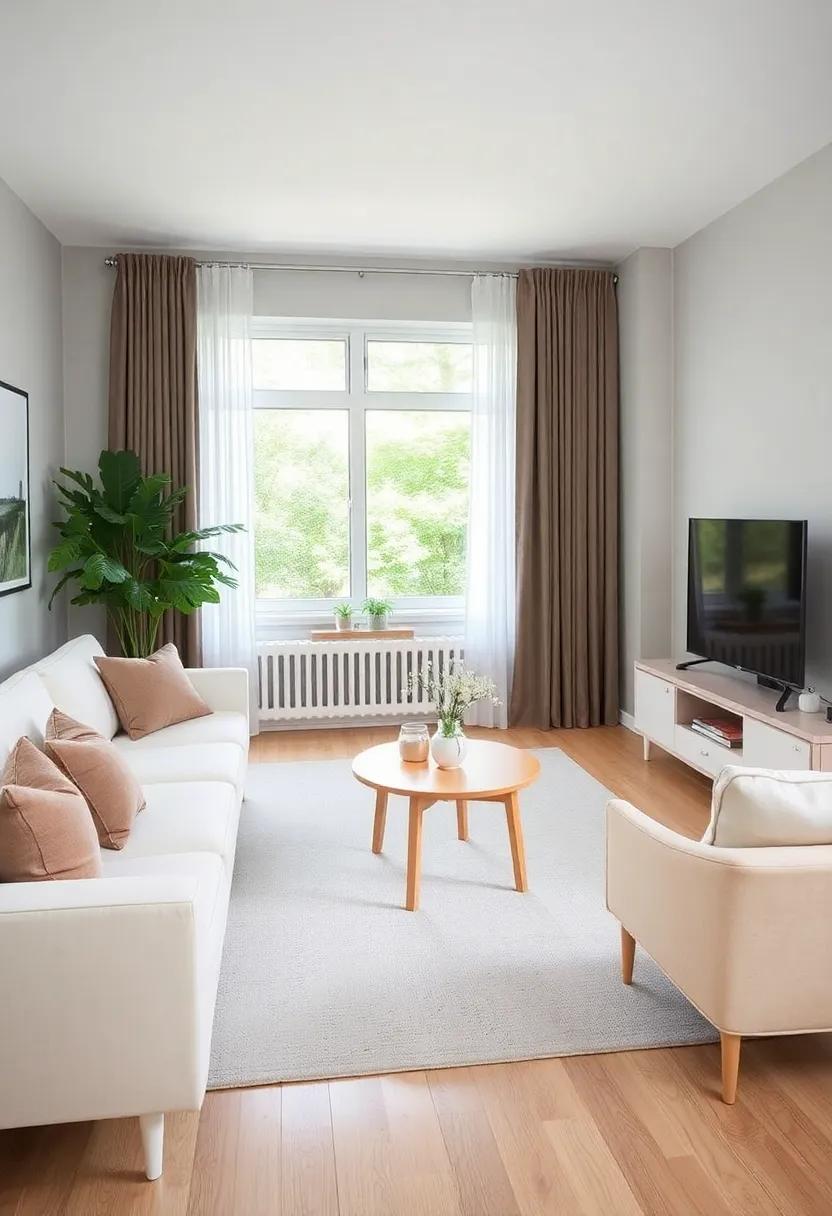
In a world filled with excess, the concept of simplicity in furniture design invites a sense of calm and purpose into our living spaces. Choosing pieces that are not only aesthetically pleasing but also serve multiple functions can transform your small living room into a sanctuary of tranquility. Common choices that embody this simplistic elegance include:
- Modular sofas that adapt to your needs and space.
- Coffee tables with hidden storage for a clutter-free environment.
- Floating shelves to display art while saving floor space.
These selections underline the importance of functionality without sacrificing style. An inviting ambiance can be achieved through a well-curated palette and the strategic arrangement of furniture. consider incorporating light colors and natural materials that reflect light, enhancing the perception of space. To illustrate the choices that exemplify this philosophy, here’s a succinct comparison of options:
| Furniture type | Functionality | Aesthetic Appeal |
|---|---|---|
| Modular Sofa | Adaptable seating | Modern design |
| Coffee Table with Storage | Clutter management | Stylish centerpiece |
| Floating Shelves | Space-saving storage | Artistic display |
Creating Harmony with Nature: Incorporating Indoor Plants into Small Areas
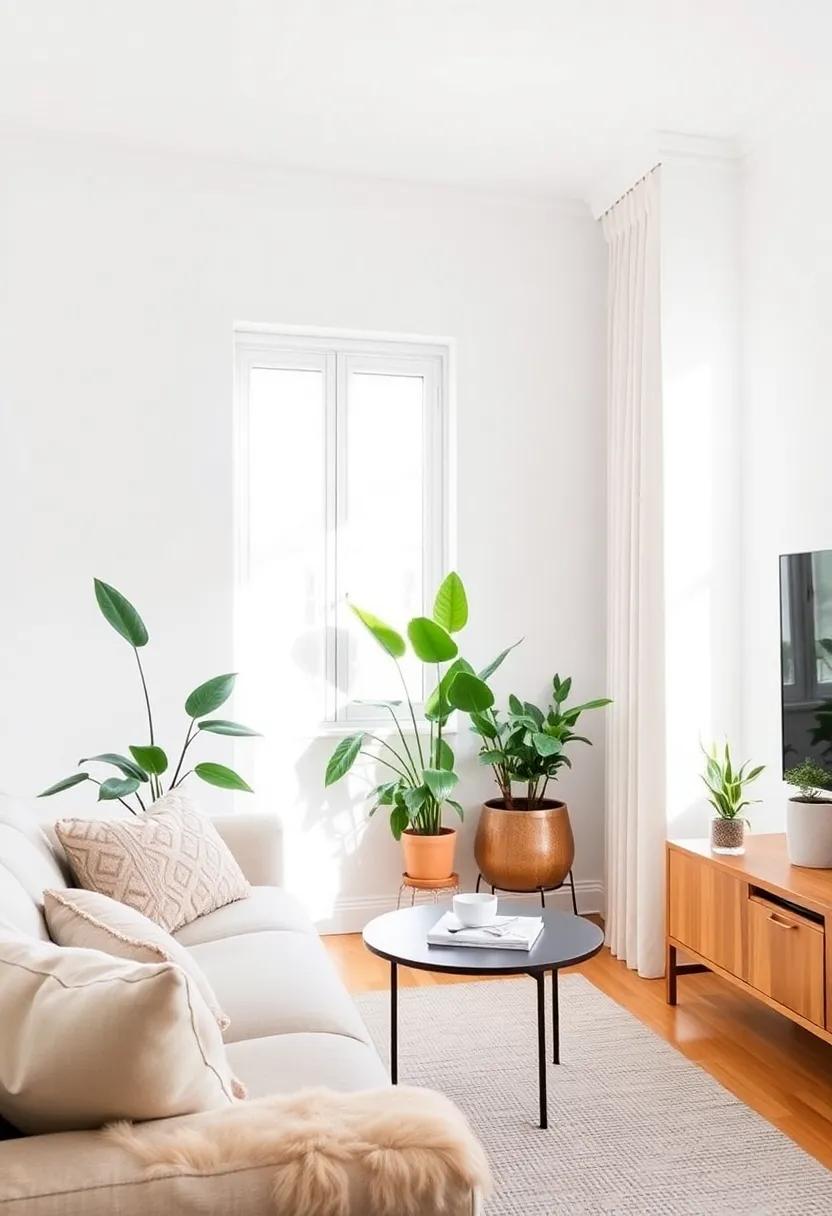
Integrating indoor plants into small living spaces not only enhances aesthetic appeal but also promotes a sense of calmness and well-being. Choosing the right plants for limited areas can create a stunning focal point while maintaining the minimalist ethos. Consider options that are both visually appealing and easy to care for. Some excellent choices for small areas include:
- Succulents – They require minimal water and thrive in tight spaces.
- Spider Plants – their arching leaves bring movement and vibrancy.
- Pothos – Provides trailing greenery that softens corners.
- Air Plants – They don’t need soil, making them perfect for placing on shelves or inside terrariums.
To further enhance the harmonious vibe created by these plants, consider their placement. Utilize vertical space by hanging planters or installing wall-mounted shelves. this creative positioning can add dimension without overcrowding the room. Additionally, selecting pots that reflect your minimalist style—such as simple ceramic or matte finishes—can unify the look. A chic coffee table centerpiece could feature a small potted plant, enriching the space while remaining functional. Below is a table summarizing tips for plant placement:
| Placement Tips | Benefits |
|---|---|
| Use wall shelves | Maximizes space while adding height |
| Choose multi-functional furniture | Incorporates greenery without sacrificing space |
| Group plants of varying heights | Creates visual interest and depth |
Open Spaces: The Impact of Layout on minimalist Aesthetics
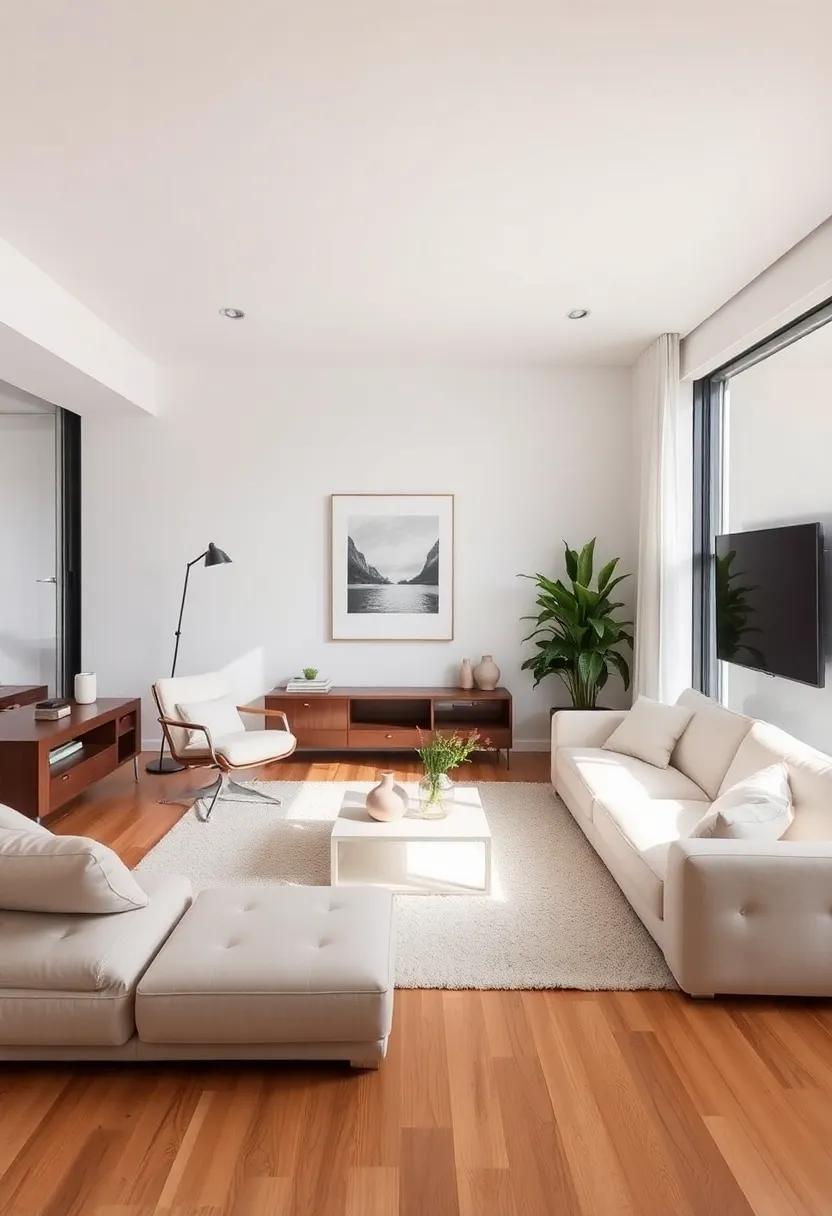
Effective layout plays a crucial role in enhancing the feeling of openness in a minimalist small living room. by choosing furniture strategically and minimizing clutter, you can create an airy atmosphere that encourages relaxation and clarity of mind. Consider the following elements to achieve a harmonious flow:
- Furniture Arrangement: Positioning larger pieces closer to the walls can help to open up the central space.
- Defined Pathways: Ensuring clear walkways invites movement and natural light to play across the room.
- Multifunctional Pieces: Selecting furniture with dual purposes maximizes utility while maintaining simplicity.
To visually enhance the minimalist approach, consider utilizing a color palette that complements the open layout. Neutral tones can expand the sense of space,while occasional pops of color can add interest without overwhelming the senses. For a more organized look, employing a table can effectively illustrate how various color schemes and layouts can impact the overall feel of your living area.
| Color scheme | impact on Space |
|---|---|
| Light Grays & Whites | Creates an expansive, airy ambiance |
| Pastel Accents | adds warmth without heaviness |
| Dark Tones | Can create intimacy, but may close off space if overused |
Mindful Decor: Selecting Meaningful Art for a tranquil Atmosphere
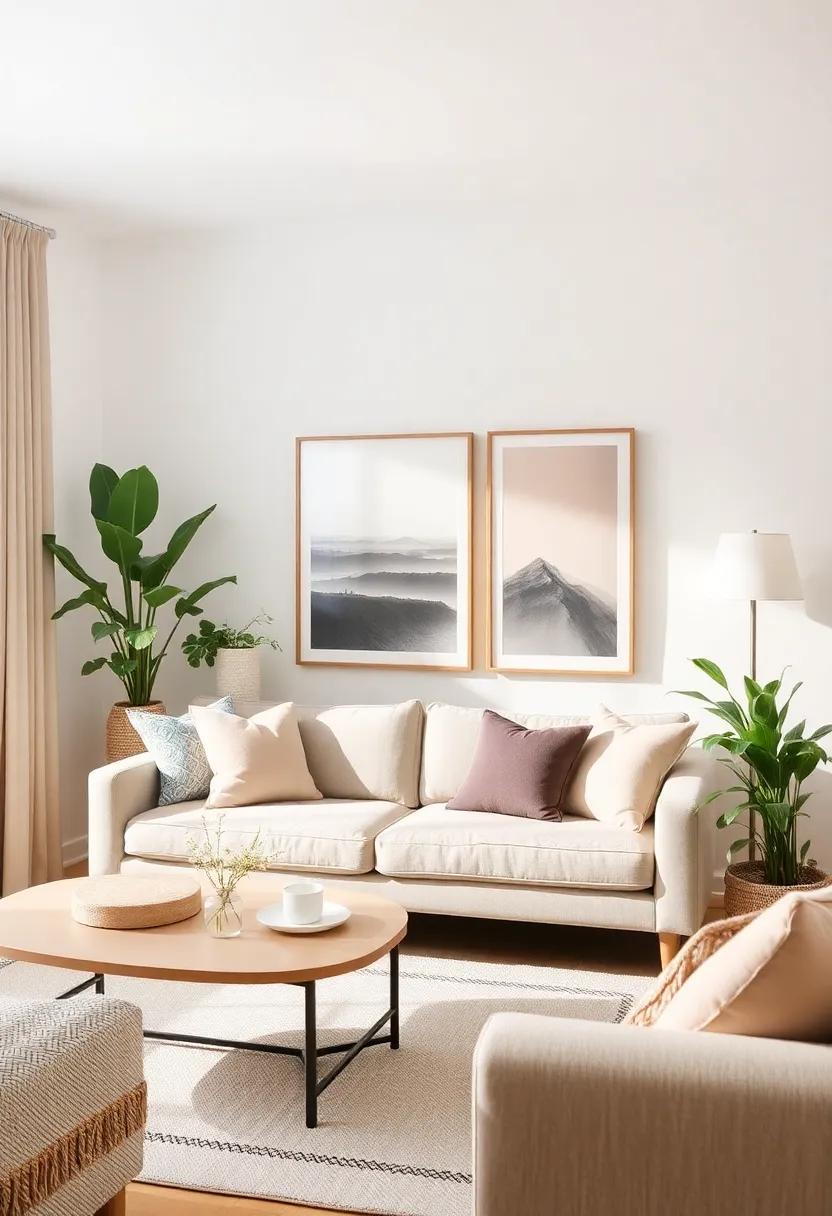
Creating a tranquil atmosphere begins with the selection of art that resonates with your personal journey and the emotions you wish to evoke in your small living room.Consider pieces that reflect serenity, mindfulness, or natural beauty. Whether it’s a soothing landscape, an abstract interpretation of calm waters, or a calming color palette, the art should harmonize with the room’s overall aesthetic. Aim for a cohesive visual language, where:
- Color Schemes: Choose artworks that complement your existing decor.
- Themes: Select pieces that align with nature, minimalism, or personal experiences.
- sizes: Opt for simple shapes and sizes that won’t clutter the space.
When arranging your selected art, think about negative space; the area surrounding a piece is as critically important as the piece itself. This allows for a more balanced look and reinforces a sense of openness. Consider using a simple grid layout or a gallery wall that is well-spaced. Here’s a fast reference table to help you identify the ideal placement based on art size:
| art Size | Placement Advice |
|---|---|
| Small (up to 12 inches) | Group with other small pieces for visual impact. |
| Medium (12-24 inches) | Hang at eye level for optimal viewing. |
| Large (24 inches and above) | Use as a focal point above furniture, ensuring it is not too high. |
The Art of Decluttering: Strategies for a Clean and Calm Living Room
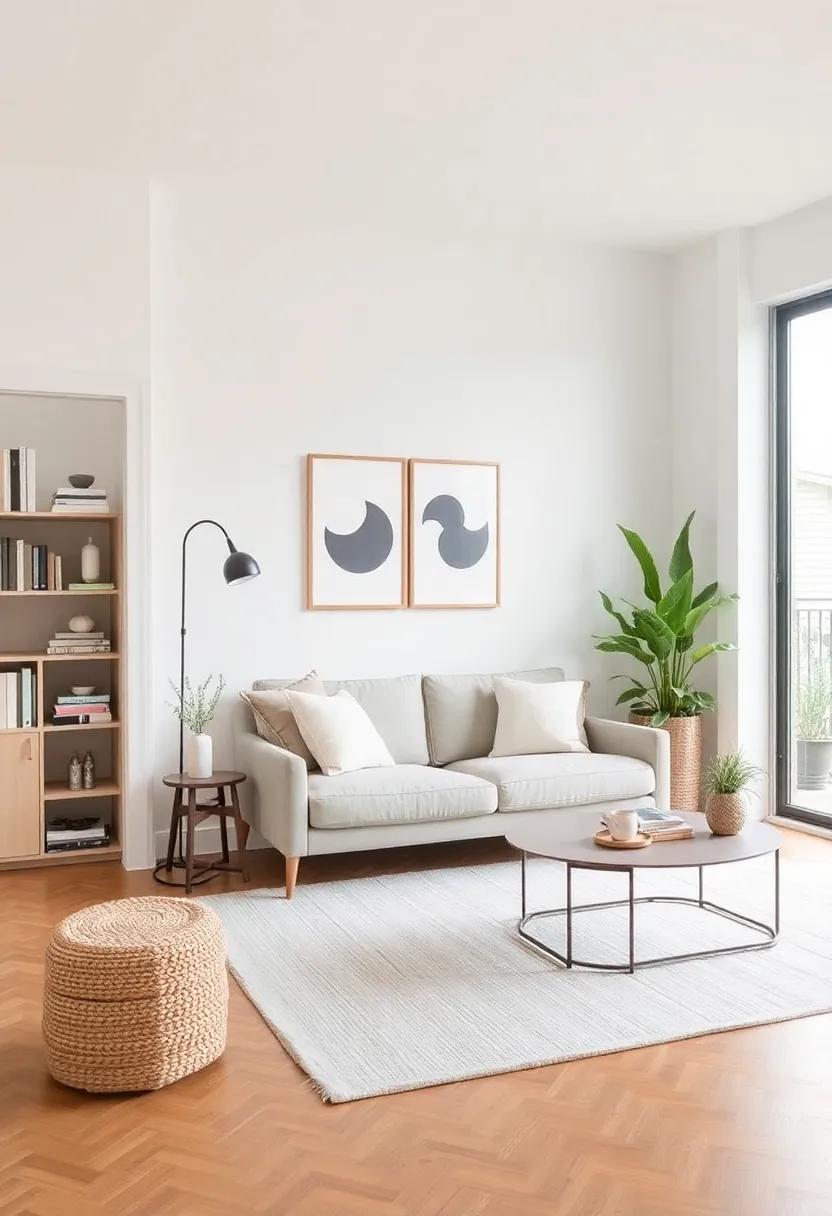
Achieving a serene living room begins with the philosophy of simplicity, focusing on what you truly need and love. Start by evaluating your furniture: Choose pieces that serve both function and aesthetic, ensuring they align with your minimalist vision.Consider incorporating multi-functional furniture, such as a sleek coffee table with storage or a stylish ottoman that can double as seating. You can enhance tranquility by strategically placing plants to bring in a natural element, but keep the number minimal to avoid a cluttered look. Remember, less is more—embrace open spaces to foster a calm atmosphere.
Next, tackle your decorative items. Adorn your living room with only a select few cherished items, such as a favorite artwork or a family photo in a gorgeous frame. Create visual interest without overwhelming the senses by honing in on a cohesive color palette and texture. Organize items in groups of three or five on surfaces to instill harmony, and don’t shy away from negative space—it’s just as important as what you display. Refer to the table below for a quick guide on how to curate your décor:
| Item Type | Max Recommended | Tip |
|---|---|---|
| Decorative Pillows | 3 | Choose various textures in a cohesive color scheme. |
| Wall Art | 1-2 pieces | Opt for larger statements to create impact. |
| Books or Magazines | 3-5 | Use stylish boxes for storage to keep it tidy. |
Textural Contrast: Layering for Depth in a minimalist Environment
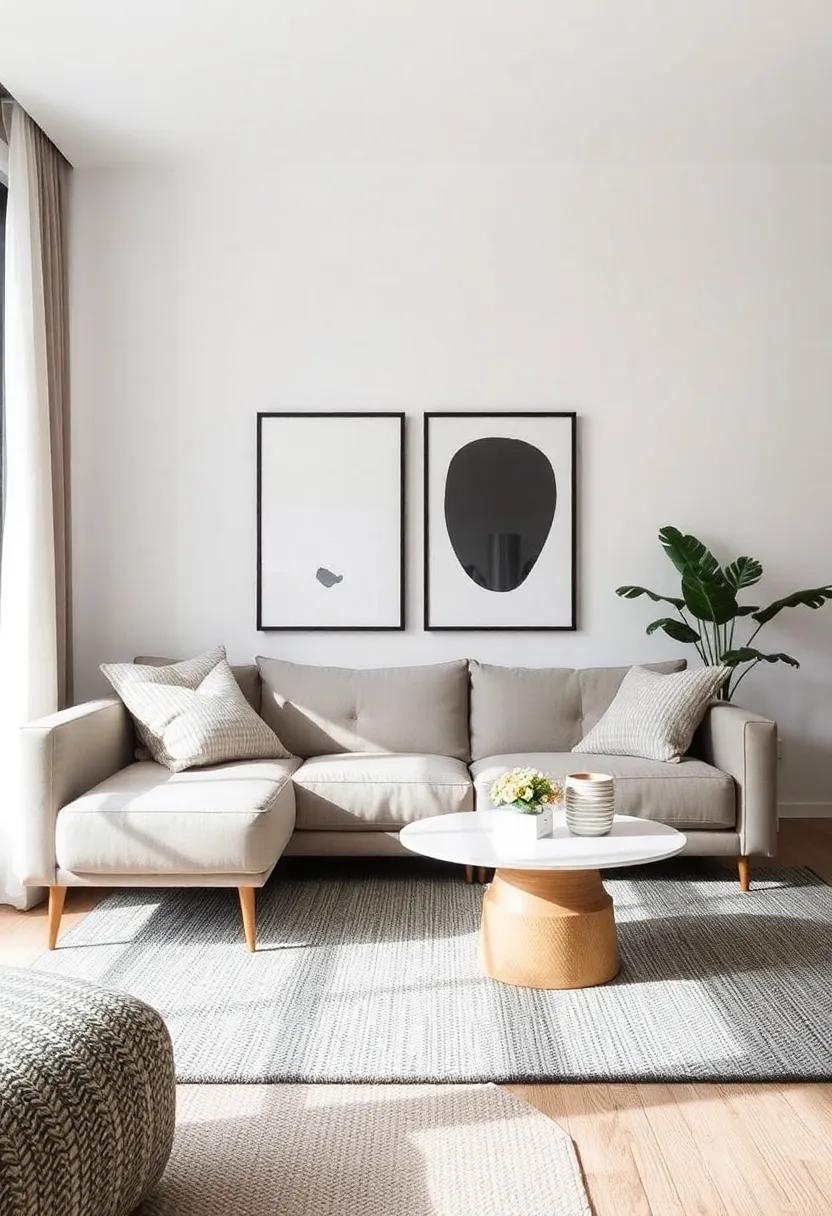
In a minimalist small living room, the beauty ofen lies in the details, where subtle textures can transform a serene space into a cozy haven. Layering materials like soft knits, smooth ceramics, and rough-hewn woods creates a visual and tactile contrast that adds depth without overwhelming the senses. Consider integrating elements such as:
- Textured Throws: Draping a chunky knit throw over a sleek sofa can evoke warmth.
- ceramic Accents: Pottery with a matte finish paired with polished furniture enhances the beauty of simplicity.
- Natural Elements: Incorporate small wooden sculptures or a jute rug to introduce an earthy feel.
Balancing these various textures not only enriches the aesthetic but also creates an inviting atmosphere where relaxation flourishes. To further refine the layering approach, one might explore how color plays into texture with a muted palette that encourages tranquility. For instance, a simple table setup could highlight this interplay, as shown below:
| Material | Texture Type | Color |
|---|---|---|
| Cotton | Soft | light Gray |
| Bamboo | Smooth | Natural Beige |
| wool | Chunky | Muted Olive |
Personalizing Your Space: Infusing Character with Selective Accents
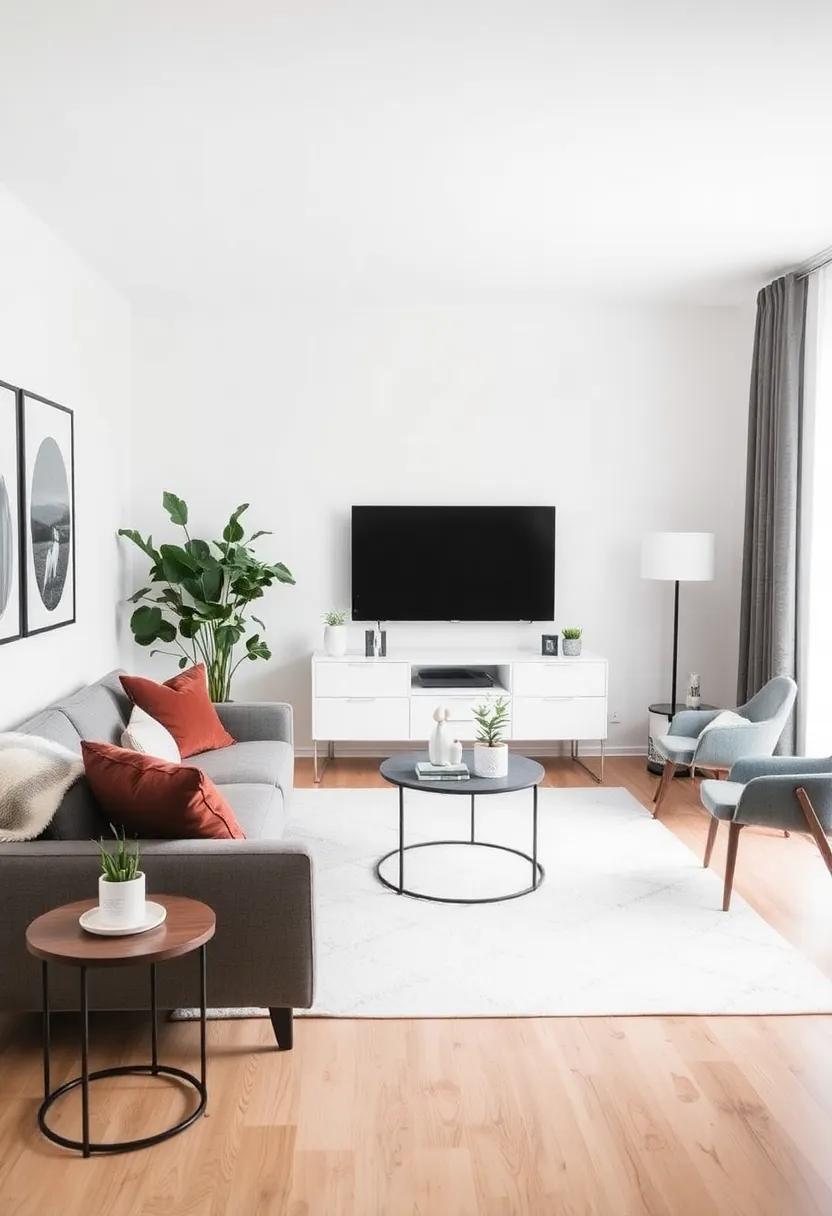
Creating a space that reflects your personality is key to a harmonious environment, especially within the confines of a minimalistic small living room.Selective accents serve as the brushstrokes that transform a simple canvas into a vibrant portrait. Consider incorporating a few eye-catching items that speak to your character, such as:
- Art Pieces: A unique painting or a handcrafted sculpture can serve as a focal point.
- Accent Pillows: Choose cushions in complementary colors or textures that invite comfort.
- Personal memorabilia: Displaying treasured items can evoke memories and spark conversations.
- Statement Rugs: A beautiful rug can add warmth and pull the entire room together.
To ensure these accents don’t overwhelm the minimalist ethos, keep the arrangement intentional and balanced. Create zones of interest by using accent tables or shelving to highlight your curated pieces. A small side table can become an exhibit of your favorite books or decorative objects. Maintain visual coherence with a harmonious color palette that complements your primary furniture choices.
| Accent item | Purpose |
|---|---|
| Artwork | Adds personality and focal interest |
| plants | Brings nature indoors and purifies air |
| Candles | Creates a calming ambiance |
Incorporating Multi-Functional Furniture: Maximizing Utility in Style
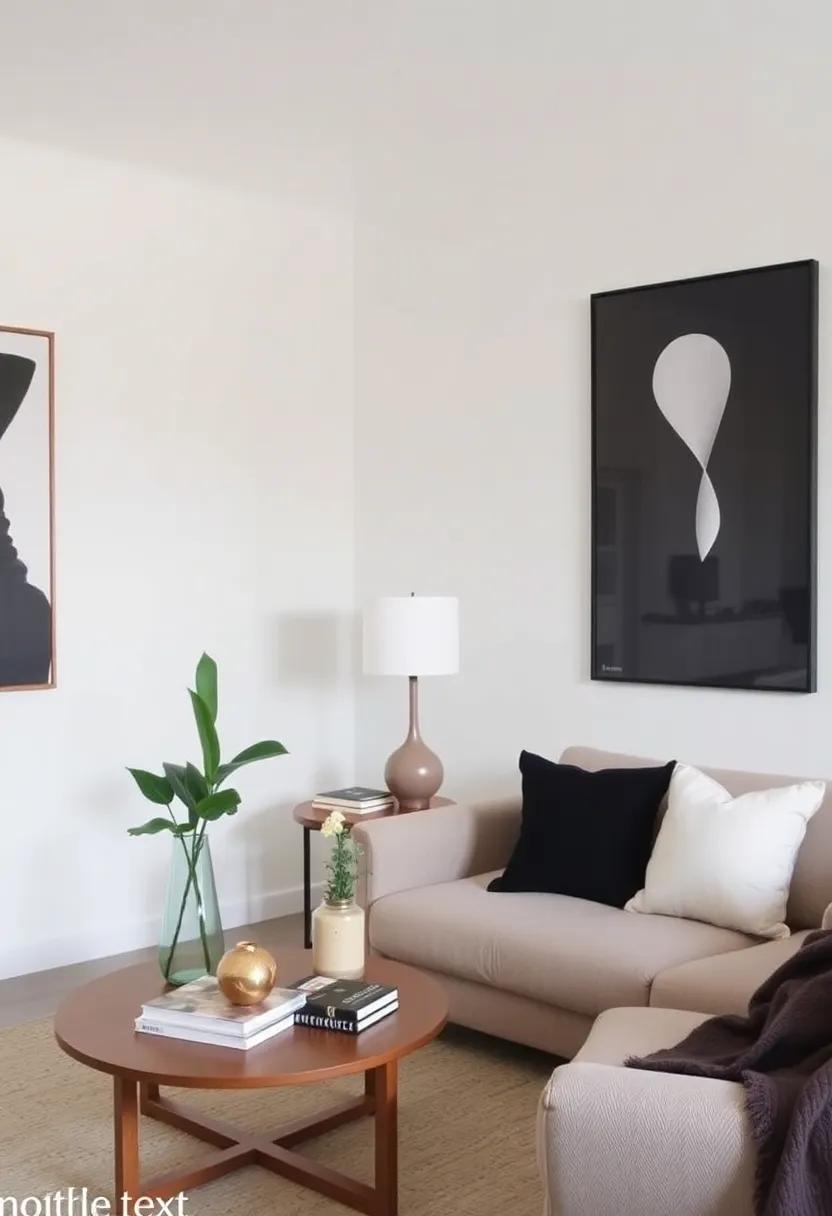
In the quest for a serene living environment,the integration of multi-functional furniture stands out as a pivotal strategy. These versatile pieces not only save valuable space but also infuse style into your decor. Imagine a sleek coffee table that transforms into a storage unit or a compact sofa bed that seamlessly blends into your minimalist aesthetic. The beauty of such furniture lies in its adaptability; it adjusts to your needs, whether you’re entertaining guests, enjoying a calm evening, or simply seeking clutter-free repose. Consider incorporating items like:
- Ottomans with storage that can double as seating or footrests.
- Wall-mounted desks provide a workspace that disappears when not in use.
- Convertible sofas that offer comfort during the day and transform into a bed at night.
- Nested tables that can be utilized as needed and tucked away when not in use.
Moreover, utilizing smart design solutions can elevate the sophistication of your small living room. A well-chosen mix of textures and shapes can enhance the functional aspects of your furniture while maintaining an air of elegance. As an exmaple, a slim-profile console table can serve as both an entryway piece and a TV stand, ensuring that every piece fulfills multiple roles without compromising on style. To better visualize this concept, here’s a table showcasing examples of multi-functional furniture options:
| Furniture Piece | Primary Function | Additional Function |
|---|---|---|
| sofa Bed | Seating | Guest Bed |
| Storage Ottoman | Footrest | Hidden Storage |
| Nesting Tables | Coffee Tables | Side Tables |
| Lift-Top Coffee Table | Table Surface | Work Station/Storage |
The Allure of Soft Lighting: Choosing fixtures That Create Ambience
Achieving true tranquillity in your small living room hinges significantly on the type of lighting you choose.Soft lighting can transform a space, creating an atmosphere that invites relaxation and fosters a sense of calm. When selecting fixtures, consider those that offer a warm glow, such as pendant lights, table lamps, and floor lamps. The use of dimmers can also play a crucial role, allowing you to adjust the brightness to suit different moods and times of day. Aim for a layered lighting approach; soft beads of illumination can be emitted from various sources, thus avoiding harsh shadows and creating visually appealing nooks.
When browsing for fixtures, pay attention to the materials and color temperatures that can enhance your minimalist aesthetic.Look for fabric shades that diffuse light gently, or metallic finishes that emphasize simplicity while adding subtle character. To help guide you in your selection process, here’s a brief comparison of popular options:
| Fixture Type | Light Quality | Style Compatibility |
|---|---|---|
| Pendant lights | Soft and focused | Modern, Rustic |
| Table Lamps | Diffuse and warm | Traditional, Contemporary |
| Floor Lamps | Uplifting ambient | Eclectic, Minimalist |
Accessories with Purpose: Curating Minimalist Decorative Items
In the realm of minimalist décor, every piece should resonate with intention, serving both a functional and aesthetic purpose. Carefully selected accessories can transform your small living room into a serene oasis that soothes the mind. Consider incorporating items such as:
- Geometric vases: Simple forms that showcase the beauty of flowers without becoming overwhelming.
- Natural sculptures: Crafted from stone or wood, these add organic textures that warm up the space.
- Soft textiles: Cozy throws and cushions in muted tones can introduce comfort while maintaining a sleek design.
When curating your collection,prioritize pieces that reflect a cohesive color palette and simplicity. The result is a nurturing environment that promotes calmness. A well-organized display not only enhances the aesthetic but also maximizes usability. Create a visual balance by incorporating a few larger items alongside smaller accents, as illustrated below:
| Item | Purpose |
|---|---|
| Minimalist lamp | Provides ambient lighting without cluttering the visual space. |
| Wall art | Enhances the room’s character while keeping surfaces clear. |
| Candle holders | Adds warmth and a sensory experience with fragrance. |
Creating Nooks of Calm: Designating Spaces for Relaxation within Small Rooms
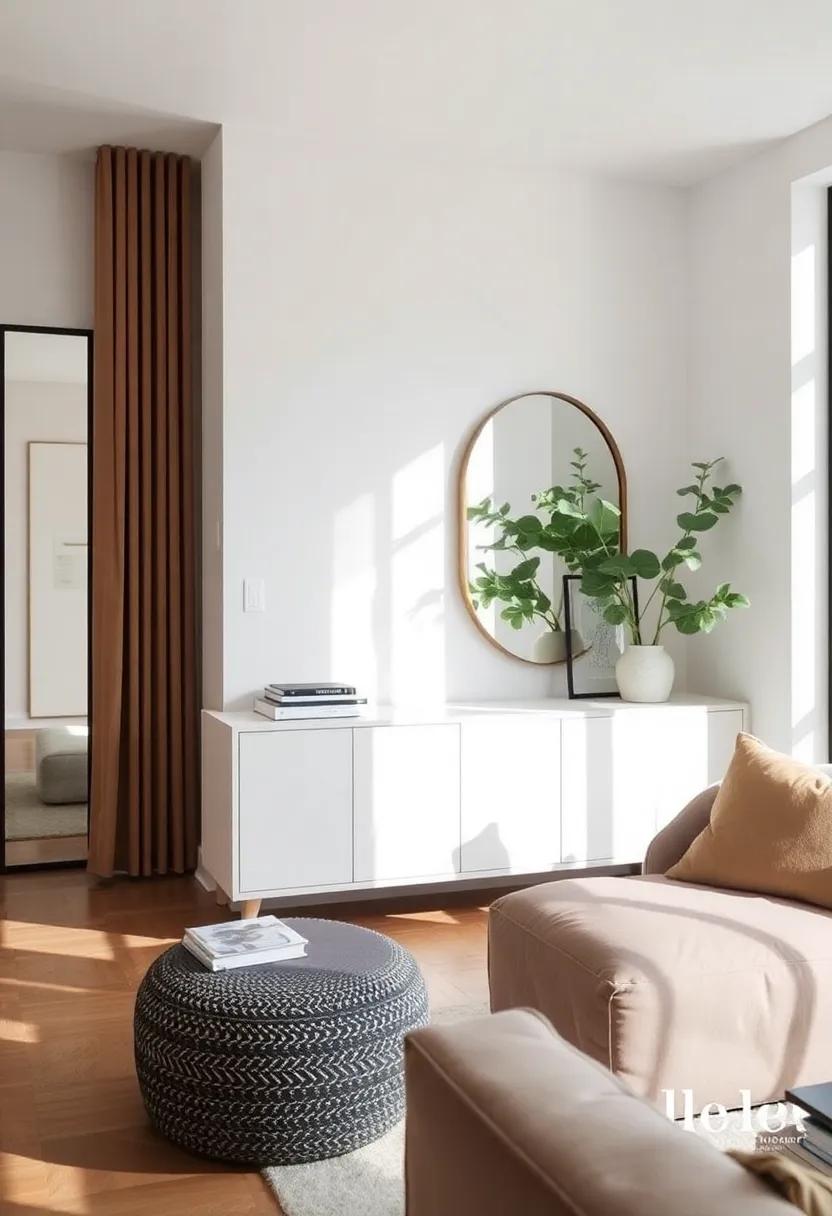
In a world where chaos often reigns supreme, finding pockets of tranquility within our living spaces becomes essential, especially in small rooms. By thoughtfully designating areas specifically for relaxation, you can cultivate a sanctuary that allows for respite from the hustle and bustle of daily life. Consider the following elements when carving out your nook of calm:
- A Comfy Chair: Opt for an oversized chair or a sleek chaise that invites you to sink in and unwind.
- Soft Lighting: Layered lighting, including a warm table lamp or fairy lights, creates an inviting and soothing atmosphere.
- Textural Elements: use plush cushions,soft throws,and rugs to add warmth and comfort to your dedicated space.
- Natural Touches: Integrate plants or soothing artwork that resonates with nature to enhance feelings of peace.
Strategically positioned within the room,your relaxation nook should harmonize with the overall aesthetic while offering a distinct sense of escape. Use furniture to delineate your space; a stylish folding screen or a use of varied rugs can visually segregate areas without overwhelming the already limited square footage. Consider the following simple table to visualize your design elements:
| Element | Purpose |
|---|---|
| Comfy Chair | Invites relaxation |
| Soft Lighting | Creates ambiance |
| Textiles | Adds comfort |
| Plants | Increases tranquility |
Sustainable Choices: Eco-Friendly Materials for Minimalist Living
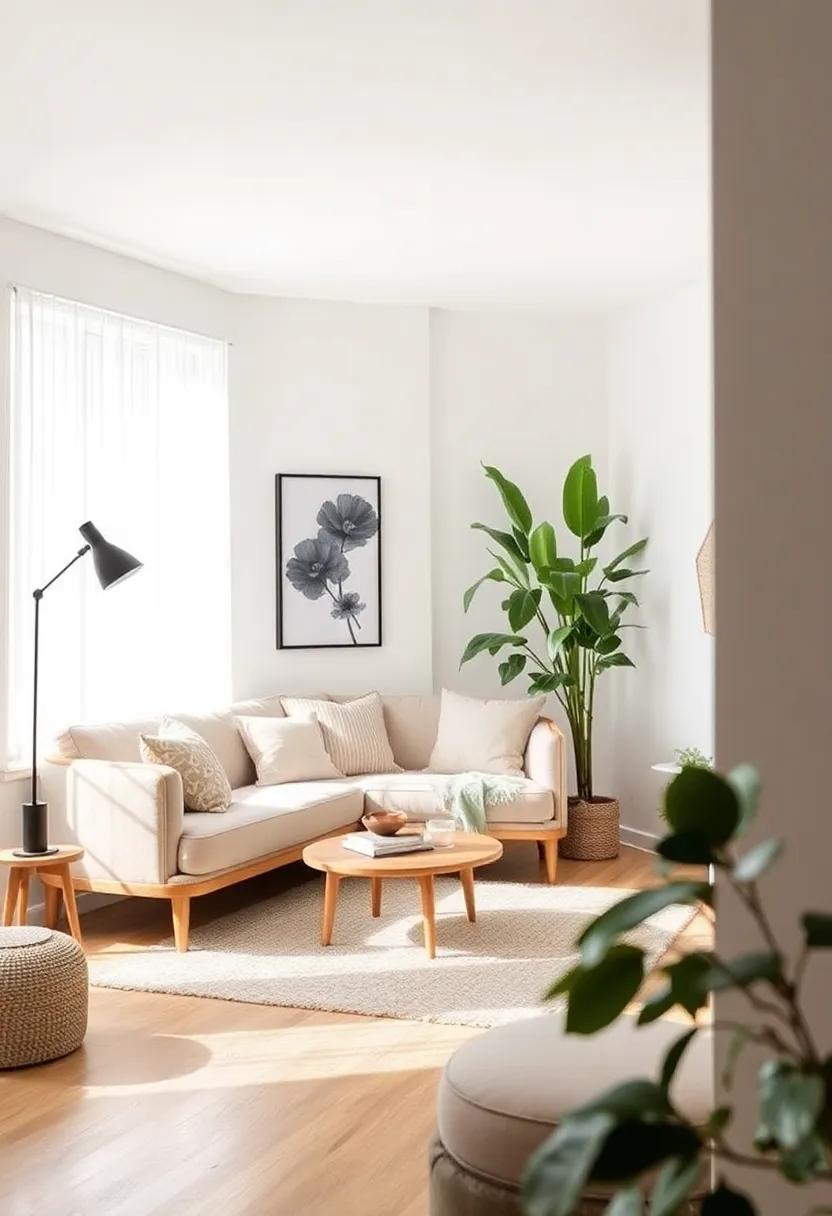
In the journey toward minimalism, choosing eco-friendly materials not only enhances your small living space but also contributes significantly to environmental wellness. By selecting items made from sustainable resources, you align your decor with your values. For instance, consider furniture crafted from reclaimed wood or bamboo, both of which are renewable and biodegradable. Pair these elements with fabrics like organic cotton or hemp to create an inviting, serene atmosphere that reflects simplicity and sustainability. The combination of these materials promotes a sense of calm while ensuring that your living environment remains free from harsh chemicals and allergens.
when accessorizing a minimalist living room, opt for decor that embodies functionality without compromising style. Some eco-friendly choices include:
- recycled glass vases – Perfect for showcasing fresh flowers or as standalone art pieces.
- Cork coasters - Naturally antimicrobial and renewable, adding warmth to your space.
- Biodegradable planters – A nod to indoor greenery that nurtures mental well-being.
To help you visualize the impact of eco-friendly materials, here’s a quick comparison of common choices:
| Material | Eco-Friendliness | Durability |
|---|---|---|
| Reclaimed Wood | High | Very Durable |
| Bamboo | Moderate | Highly Durable |
| Organic cotton | High | Durable |
Reflections of Calm: Utilizing Mirrors to Enhance Space and Light
Mirrors are more than mere reflections; they serve as remarkable tools in redefining the ambiance of a small living room.The strategic placement of mirrors can create a sense of depth and openness, visually expanding the space while bathing it in light. Consider incorporating large wall mirrors or a series of smaller decorative mirrors arranged in an artistic configuration as a focal point. This not only draws the eye, but also enhances the effect of natural light, making the room feel serene and airy. In a minimalist aesthetic, a sleek, frameless design or mirrors with subtle frames can contribute to a cohesive and uncluttered look.
To maximize this effect, reflectivity should be balanced with the selection of colors and textures. Placing mirrors opposite windows or light sources can amplify daylight, creating an ethereal glow during the day. Pairing them with light-toned furniture and soft textiles further augments the tranquil ambiance. Here are a few tips to consider when incorporating mirrors:
- Choose the right size: Oversized mirrors can become statement pieces, while smaller, clustered mirrors can provide a playful touch.
- Frame styles: Select frames that resonate with your overall decor—sleek for modern minimalism or rustic for a cozy essence.
- Reflective surfaces: Not all mirrors need to reflect images; some can offer a visual softness that complements surrounding materials.
Soundscapes of Silence: Incorporating Elements for Acoustic Tranquility
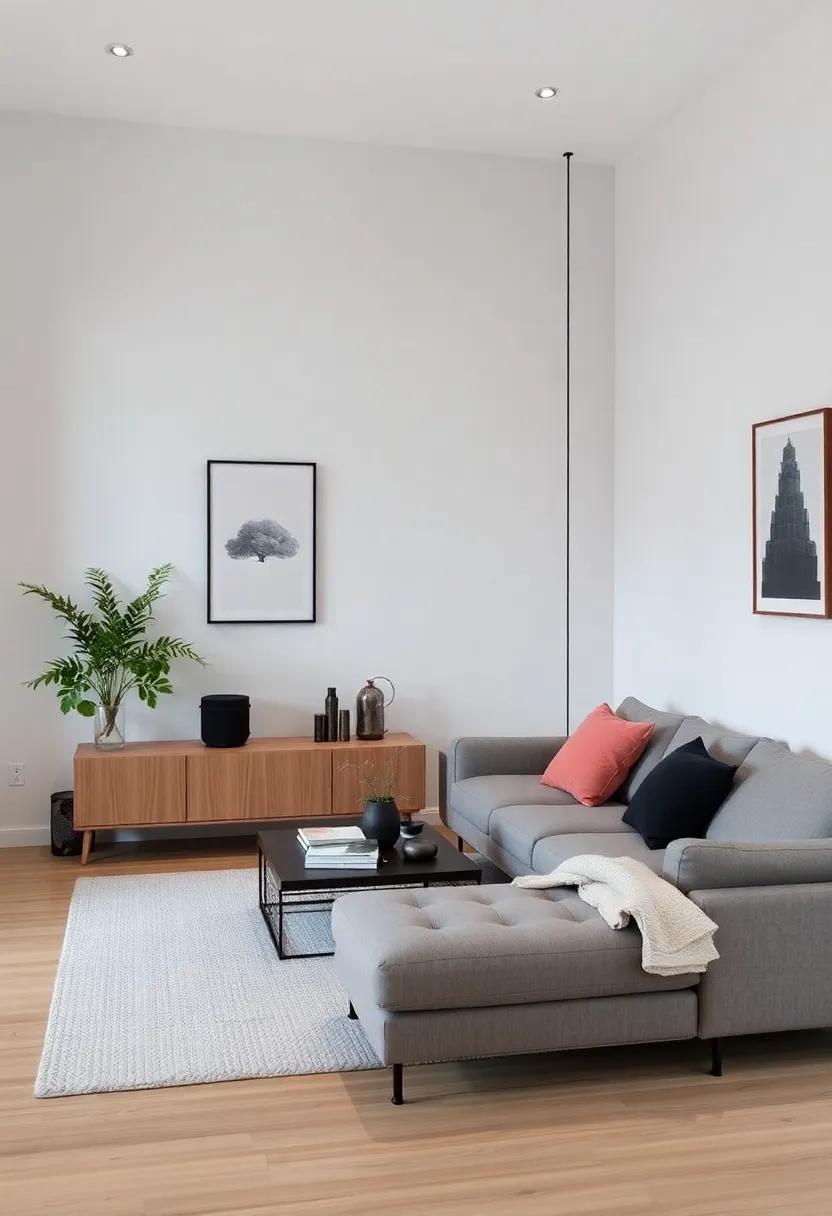
In the quest for acoustic tranquility,the design of a small living room can harness the soothing power of silence. By cultivating a purposeful arrangement of elements, one can create a soundscape that promotes serenity. Consider the use of soft furnishings that absorb rather than reflect sound, such as plush cushions and deep-pile rugs. Choose materials like velvet or felt, which can significantly reduce unwanted echoes. Furthermore, strategically placing indoor plants not only enhances aesthetics but also acts as natural sound barriers, creating a peaceful oasis in the heart of your home.
integrating a palette of muted tones enhances the serene atmosphere, guiding attention to the stillness rather than distractions. Elements such as textured wall treatments or wooden accents can add depth without overwhelming the senses. To further cultivate a sound-friendly environment, employ the use of soft lighting to promote relaxation, allowing for a calming ambiance that feels inviting. Here’s a simple guide to pairing these components effectively:
| Element | Purpose |
|---|---|
| Plush Rugs | Sound absorption |
| Indoor Plants | Sound barrier |
| Soft lighting | Promotes relaxation |
| Textured Walls | Adds depth |
Rugs and Textiles: Softening the Hard Lines for Comfort and Warmth
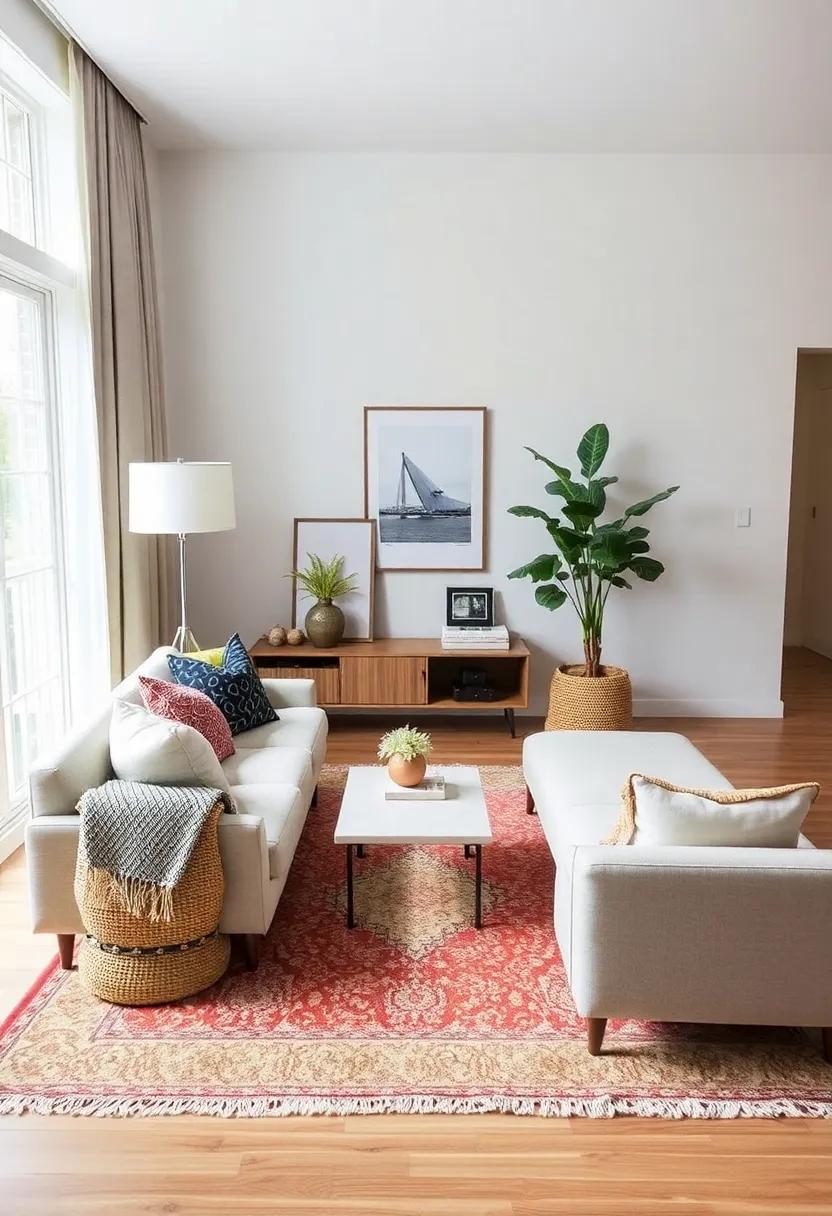
In the realm of small living room aesthetics, the choice of rugs and textiles plays a pivotal role in nurturing a sense of serenity. By layering various textures through carefully selected textiles, you can create a harmonious environment that not only invites relaxation but also enhances the overall aesthetic. A few strategic placements of plush area rugs can delineate spaces and add warmth beneath footfalls,softening the often stark edges of minimalist design. To amplify coziness in a compact setting, consider the following:
- Natural Fibers: Rugs made of jute or wool can provide an organic feel
- Color Palette: Soft, neutral tones can visually expand the space
- Layering Options: Combining different textures offers depth and interest
Moreover, textiles like throw pillows and lightweight blankets introduce an element of comfort and invite a casual ease to the room’s atmosphere. These accents not only add visual intrigue through patterns and fabric types but also create a welcoming and lived-in vibe.It can be beneficial to curate a selection that incorporates lightweight materials and soft hues, as this supports a tranquil aesthetic while ensuring comfort. When decorating, keep in mind:
| Textile Type | best Aspects |
|---|---|
| Throw Pillows | Textural contrast and color pops |
| Blankets | Layering warmth and comfort |
| Wall Hangings | Visual interest and space-enhancing illusion |
Capturing Cozy: The Emotional Effect of Minimalist Small Living Room Design
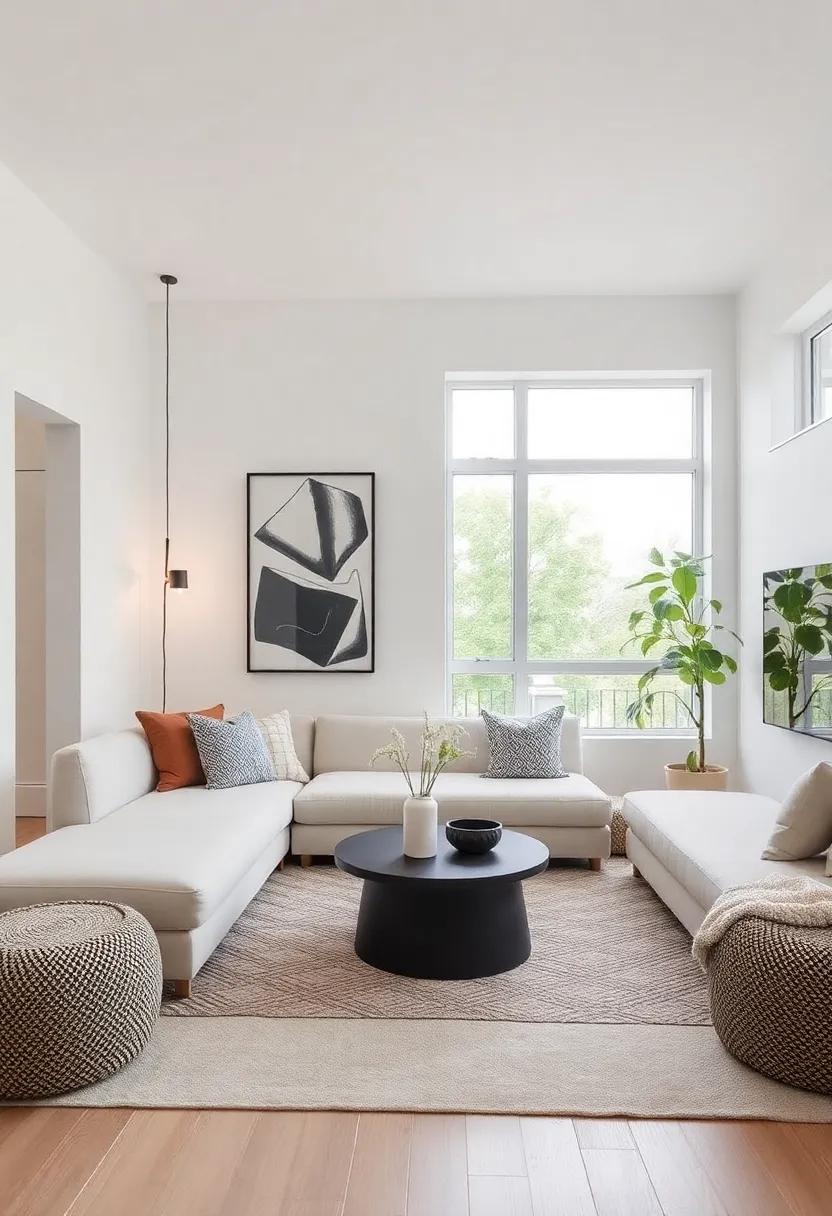
In a world brimming with overstimulation and chaos, the embrace of minimalist design in a small living room can provide a soothing refuge. Every piece of furniture, every decor item, is deliberately chosen to create an atmosphere that promotes clarity and peace. The emotional effect of this intentional simplicity resonates deeply, allowing individuals to feel grounded and serene.Key elements that contribute to this cozy ambiance include:
- Neutral Color Palettes: Soft whites, muted grays, and gentle earth tones create a calming backdrop.
- Natural Light: Maximizing sunlight with unobstructed windows encourages warmth and a sense of openness.
- Functional Furniture: Lightweight, multi-purpose pieces ensure that space remains uncluttered and inviting.
The essence of the design lies in its ability to foster a connection to oneself and the surrounding environment.By reducing visual noise and unneeded clutter, the small living room transforms into a sanctuary where the mind can unwind, evoking feelings of comfort and contentment. Elements such as soft textures, padded seating, and purposeful decor cultivate a sense of belonging and intimacy. Consider a table showcasing the integration of essential components for a minimalist design:
| Design Element | Emotional Impact |
|---|---|
| Neutral Tones | Promote Calmness |
| Open Layout | Encourages Flow |
| Natural textures | Fosters Warmth |
| Thoughtful Lighting | Enhances Mood |
The Conclusion
As we step away from the clutter and chaos of modern living, embracing tranquility through minimalist small living room aesthetics offers not just a design choice, but a mindful lifestyle. The artistry of simplicity invites us to craft spaces that speak to our need for both beauty and functionality, reminding us that less can indeed be more.By focusing on essential elements, we create environments where peace can flourish, allowing each carefully chosen piece to resonate with purpose.
in this journey towards serene minimalism, remember that your living space is an extension of who you are. Each corner holds the potential to be a sanctuary, a reflection of your values and aspirations. As you navigate this artistic endeavor, let yourself be guided by the principles of intentionality and clarity, transforming your small living room into a haven that nurtures both spirit and soul.
Ultimately, embracing tranquility through minimalist design is not merely about aesthetics; it’s about cultivating a lifestyle that harmonizes with your inner self. As you let go of the superfluous and invite in the essential, may your small living room become a canvas where serenity is painted with every choice you make. So,take a deep breath,delight in the beauty of simplicity,and let your space tell your story of calm.

